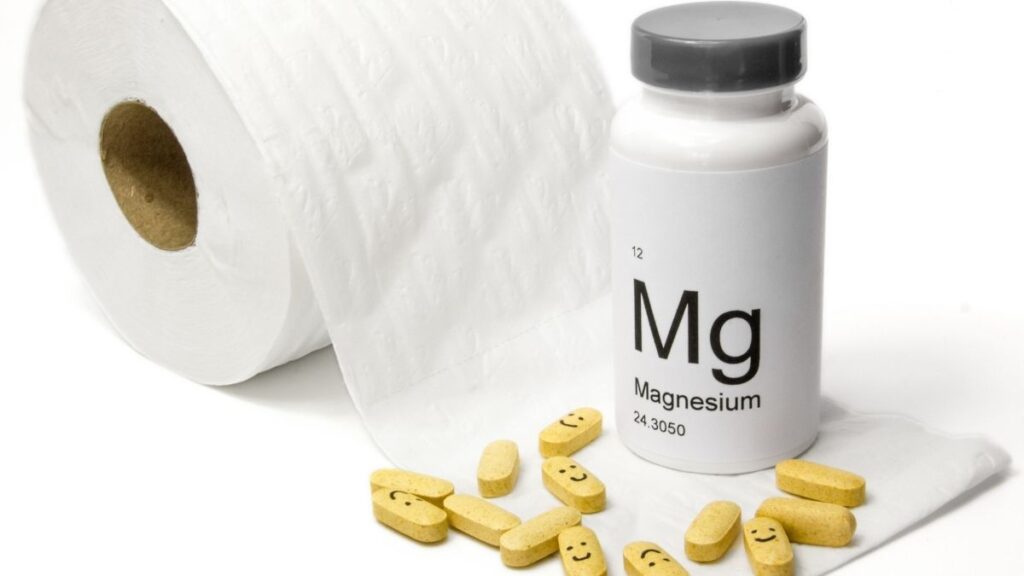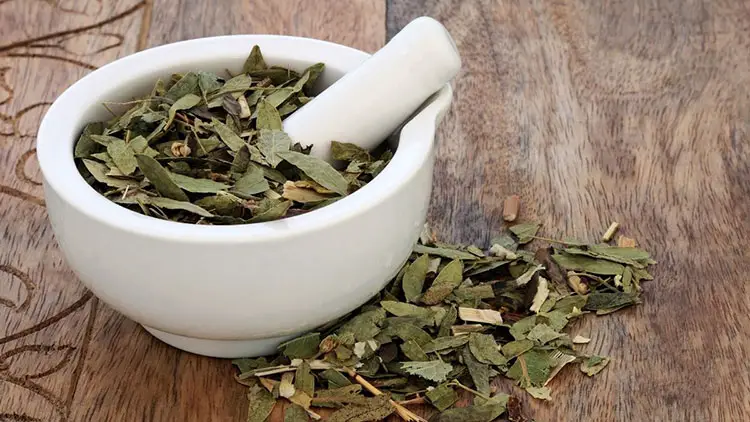If you’re new to taking magnesium you might find yourself visiting the toilet more often, and thus wondering: does magnesium make you poop?
As you get older, it may seem like many things in your body are slowing down and/or getting weaker and it may become harder to meet changing nutrition needs. Your muscles seem weaker and even your colon seems to slow down. You only have a bowel movement every few days, and it makes you irritable and even angry but you don’t know why. Here comes the magnesium!
Magnesium helps bowel movements by 1) relaxing the intestinal muscles to helps stool pass, and 2) by drawing water into the intestines which increases the size of the stool and making it softer, helping prompt a bowel movement.
Chronic constipation is common in anyone over the age of 60, and if you visit nursing homes and take a survey, you’d see that 50% of nursing home residents have it.
Many people have a lot of different remedies for constipation, but one of the most common ones is magnesium.
What Magnesium Does in Your Body
Magnesium is one of the essential minerals you need for good health. It’s needed for protein synthesis, energy production, reproduction, DNA and RNA synthesis, nerve transmission, heart excitability, muscle contraction, tone of the arteries and veins, blood pressure regulation and more.
Studies have shown that magnesium is also helpful for the following conditions:
- migraine headaches
- preeclampsia
- eclampsia
- heart arrhythmia
- severe asthma
- lowering the risk of metabolic syndrome
- improves glucose and insulin metabolism
- relieves symptoms of PMS
- alleviates leg cramps in pregnant women
Magnesium hydroxide is the most commonly used substance for constipation. Magnesium sulfate is another form of magnesium that is also effective for constipation.
- SUPPORTS BONE HEALTH: Magnesium supports bone health and maintains bone mineralization; (1) One Nature’s Bounty Magnesium tablet provides 119% of the daily recommended Magnesium you need to promote a strong skeletal system (1)
- A MUSCLE SUPPORT SUPPLEMENT: Magnesium supports muscle contractions; nerve impulses; energy metabolism and protein formation; and helps to promote strong healthy muscles (1)
And if you take supplements, there are several forms of magnesium you can get in capsule form: magnesium bisglycinate, magnesium oxide, magnesium citrate, magnesium malate, magnesium taurinate, and magnesium amino acid chelate. Most supplements are anywhere from 200 mg up to 500 mg per dosage or capsule.
What is Considered Constipation and What’s Not?
If food is going into the body but not coming out, where is it going? It’s staying in the intestines, which were never intended as a “suitcase” for already processed food. The longer food stays in the body, the more it starts changing with the chemicals inside the food becoming more and more carcinogenic.
There’s a big difference in attitudes about how long health practitioners believe food should stay in the GI tract. Medical doctors often take a careless attitude about it, and many elderly patients have been told that as long as they have one bowel movement per week, they are fine.
On the other hand, natural healing practitioners have a completely different belief. Focusing on optimal health, they report that you should have one bowel movement for every meal going in. They say that that’s when you feel like you are at your best.
What are the Reasons for Constipation?
There are many reasons for constipation. Here’s a list of some of them:
- Not enough water
- Magnesium deficiency
- Not enough fiber in the diet
- Use of medications such as opioids and other pain killers
- Nervous system diseases that slow down colon motility
- Poor bowel habits
- Parasites
- Improper flora in the gut
- Use of iron supplements
- Lack of exercise
- Excessive alcohol intake
Each of these reasons gets even more serious when others on the list are added to it.
Caution for Taking Magnesium
You might decide to take magnesium for your constipation and that may be a good idea but do take the right steps before you do it:
- Ask your doctor if it’s a good idea for you.
- Ask your doctor to test your magnesium levels before taking magnesium.
- See a nutritionist who can evaluate your dietary intake for the mineral magnesium.
Magnesium is excreted through the kidneys so the dosage should be monitored in those who have chronic kidney disease.
If you are going to take magnesium supplements, you would want to stay under 1000 mg magnesium oxide daily and make sure you don’t take laxatives at the same time. The high doses of magnesium in combination with the laxatives contributed to chronic kidney disease.
You would know you are taking too much magnesium if you experience diarrhea, doctors at Baylor University Medical Center in Dallas, TX reported in the New England Journal of Medicine.
Sources of Magnesium and Other Anti-Constipation Agents
Magnesium is found in green leafy vegetables, nuts, legumes and whole grains. But there’s a problem with getting your magnesium in foods right now – the content of this mineral in foods is declining. As a result, magnesium deficiencies are becoming more and more prevalent.
The use of senna is a commonly used herb against constipation. One teaspoon is added to a cup of boiling hot water but it needs an anti-cramping herb with it such as fennel or peppermint in equal amounts.
- NATURAL LAXATIVES: Keep things moving with Major's Senna 8.6 mg natural vegetable laxative tablets. Derived from the Senna plant, known for its laxative properties, our sennosides tablets are a trusted solution for occasional constipation relief.
- RELIEF WHEN YOU NEED IT: Get back to feeling like yourself with our specially formulated anti-constipation medicine. These laxative tablets generally support a bowel movement within 6-12 hours, ensuring prompt relief when you need it most.
In one study of 90 constipation patients with an average age of 42 years old, senna and magnesium were both tested to a placebo. Both senna and magnesium made a significant difference in the constipation that the patients have. The placebo didn’t make any difference at all. Neither one of the natural treatments had any side effects.
In another study performed at five pediatric outpatient clinics in Japan, doctors and researchers found that children between 6 months old and 6 years old were given a placebo, magnesium, or a probiotic called Lactobacillus reuteri DSM 17938. The group that took the magnesium along with the probiotic had the most significant improvement in constipation.
- DUAL-ACTION PROBIOTIC EASES ABDOMINAL DISCOMFORT, GAS & BLOATING: If you struggle with occasional GI issues, our gut-health supporting probiotic is a game changer.* BioGaia promotes a balanced GI microbiome, easing abdominal discomfort, gas & bloating.*
- PROMOTES REGULARITY: By integrating our probiotic into your daily routine, you’ll promote a healthy gut environment, making it easier to maintain consistent & comfortable bowel movements.*
Drinking natural spring waters that are high in magnesium sulfate is another potential aide for constipation. The laxative effect of magnesium sulfate has been widely demonstrated and researchers in France believe that this type of water could make a positive difference.
Does Magnesium Make You Poop References
Guerrara, Mary, et al. Therapeutic uses of magnesium. Am Fam Physician 2009 Jul 15;80(2):157-62. https://pubmed.ncbi.nlm.nih.gov/19621856/
Mounsey, Anne, et al. Management of constipation in older adults. Am Fam Physician 2015 Sep 15;92(6):500-4. https://pubmed.ncbi.nlm.nih.gov/26371734/
Morishita, D., et al. Senna versus magnesium oxide for the treatment of chronic constipation: a randomized, placebo-controlled trial. Am J Gastroenterol 2021 Jan 1; 116(1):152-161. https://pubmed.ncbi.nlm.nih.gov/32969946/
Kubota, M., et al. Lactobacillus reuteri DSM 17938 and magnesium oxide in children with functional chronic constipation: a double blind and randomized clinical trial. Nutrients 2020 Jan 15;12(1): 225. https://pubmed.ncbi.nlm.nih.gov/31952280/
Perez-Sanchez, J. et al. Evaluation and handling of constipation in critical patients. Enferm Intensiva Oct-Dec 2017;28(4):160-168. https://pubmed.ncbi.nlm.nih.gov/28601441/
Dupont, Chirstophe and Hebert, G. Magnesium sulfate-rich natural mineral waters in the treatment of functional constipation – a review. Nutrients 2020 Jul 10;12(7):2052. https://pubmed.ncbi.nlm.nih.gov/32664341/
Mori, Hideki, et al. Clinical features of hypermagnesemia in patients with functional constipation taking daily magnesium oxide. J Clin Biochem Nutr 2019 Jul;65(1):76-81. https://pubmed.ncbi.nlm.nih.gov/31379418/ Fine, KD, et al. Diagnosis of magnesium-induced diarrhea. N Engl J Med 1991 Apr 11;324(15):1012-7. https://pubmed.ncbi.nlm.nih.gov/2005938/






